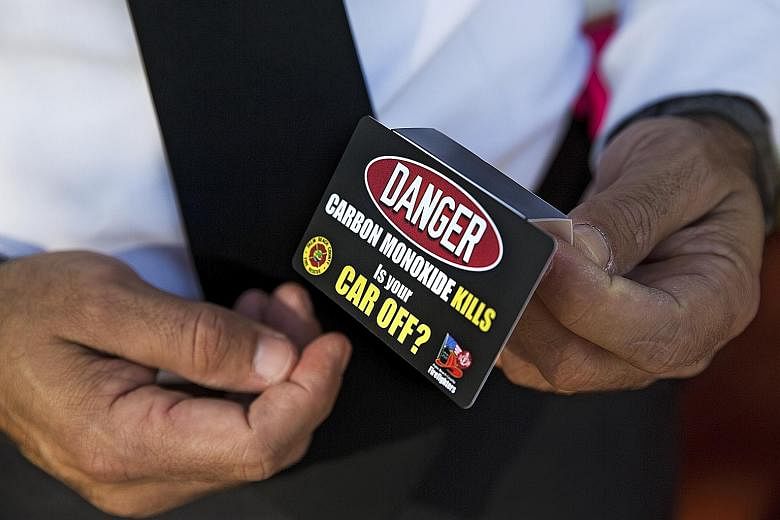NEW YORK • Last year, Mr Fred Schaub drove his Toyota RAV4 into the garage attached to his Florida home and went into the house with the wireless key fob, believing the car was shut off. Twenty-nine hours later, he was found dead, overcome with carbon monoxide that flooded his home as he slept.
"After 75 years of driving, my father thought that when he took the key with him when he left the car, the car would be off," said Mr Schaub's son Doug.
Mr Fred Schaub was among over two dozen people killed nationwide since 2006 by carbon monoxide after leaving a keyless-ignition vehicle running in a garage, figures from the news, lawsuits, police and fire records and incidents tracked by advocacy groups showed.
Keyless ignitions are now standard in over half of the 17 million new vehicles sold annually in the United States, according to the car information website Edmunds.
Rather than a key, drivers carry a fob that transmits a radio signal, and as long as it is present, a car can be started with the touch of a button. But weaned from the habit of removing a key to shut off the motor, drivers can be lulled by newer, quieter engines into mistakenly thinking it has stopped running.
Seven years ago, the world's leading automotive standards group, the Society of Automotive Engineers, called for features like a series of beeps to alert drivers that cars were still running without the fob in or near the car, and in some cases to shut the engine off automatically.
The National Highway Traffic Safety Administration proposed a federal rule based on that idea, a software change that could be accomplished for pennies per vehicle. In the face of car industry opposition, it let the plan languish though it says a rule is under consideration.
For now, regulators in the US say they are relying on carmakers to incorporate such warning features voluntarily. But a survey of 17 car companies by The New York Times has found that while some carmakers go beyond the features recommended by the standards group, others fall short.
Safety measures have been a matter of contention among carmakers, sometimes even internally. Toyota, for example, has a system of three audible signals outside the car, and one inside, to alert drivers getting out of a vehicle that the motor is still running. But when Toyota engineers determined that more effective warning signals were needed, like flashing lights or a unique tone, the company rejected the recommendation, according to testimony in a wrongful-death suit.
Toyota models have figured in almost half of the carbon monoxide fatalities and injuries identified by The Times. Toyota says its keyless ignition system "meets or exceeds all relevant federal safety standards".
Some carmakers have designed newer models that alert drivers more insistently when the engine is left running - or that shut it off after a certain period. Ford's keyless vehicles now have a feature that automatically turns off the engine after 30 minutes of idling if the key fob is not in the vehicle. But many older vehicles have not been retrofitted to reduce the hazard.
It cost General Motors US$5 (S$6.70) a car to install the automatic shut-off in a 2015 recall, said a GM report to the safety agency.
Regulations require carmakers to address other hazards associated with keyless vehicles, like theft, and those measures might also reduce the carbon monoxide danger. But the safety agency has found shortcomings and inconsistencies by carmakers in meeting those rules.
And litigation against the companies is mounting. "We're going to continue to see deaths and injuries," said Mr Sean Kane, founder of Safety Research and Strategies, a car safety research group. "And the manufacturers will continue to settle cases."
NYTIMES


